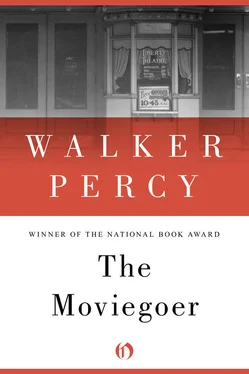Kate shakes her head slowly in the rapt way she got from her stepmother. I try to steer her away from beauty. Beauty is a whore.
“You see that building yonder? That’s Southern Life & Accident. If you had invested a hundred dollars in 1942, you’d now be worth twenty five thousand. Your father bought a good deal of the original stock.” Money is a better god than beauty.
“You don’t know what I mean,” she cries in the same soft rapture.
I know what she means all right. But I know something she doesn’t know. Money is a good counterpoise to beauty. Beauty, the quest of beauty alone, is a whoredom. Ten years ago I pursued beauty and gave no thought to money. I listened to the lovely tunes of Mahler and felt a sickness in my very soul. Now I pursue money and on the whole feel better.
“I see how I could live in a city!” Kate cries. She turns to face me and clasps her hands behind my waist.
“How?”
“Only one way. By your telling me what to do. It is as simple as that. Why didn’t I see it before?”
“That I should tell you what to do?”
“Yes. It may not be the noblest way of living, but it is one way. It is my way! Oh dear sweet old Binx, what a joy it is to discover at last what one is. It doesn’t matter what you are as long as you know!”
“What are you?”
“I’ll gladly tell you because I just found out and I never want to forget. Please don’t let me forget. I am a religious person.”
“How is that?”
“Don’t you see? What I want is to believe in someone completely and then do what he wants me to do. If God were to tell me: Kate, here is what I want you to do; you get off this train right now and go over there to that corner by the Southern Life and Accident Insurance Company and stand there for the rest of your life and speak kindly to people — you think I would not do it? You think I would not be the happiest girl in Jackson, Mississippi? I would.”
I have a drink and look at her corner. The moonlight seems palpable, a dense pure matrix in which is embedded curbstone and building alike.
She takes the bottle. “Will you tell me what to do?”
“Sure.”
“You can do it because you are not religious. God is not religious. You are the unmoved mover. You don’t need God or anyone else — no credit to you, unless it is a credit to be the most self-centered person alive. I don’t know whether I love you, but I believe in you and I will do what you tell me. Now if I marry you, will you tell me: Kate, this morning do such and such, and if we have to go to a party, will you tell me: Kate, stand right there and have three drinks and talk to so and so? Will you?”
“Sure.”
Kate locks her arms around my chest, wrist in hand, and gives me a passionate kiss.
Later, just as I knew it would, her precious beauty leaves her flat and she is frightened. Another trip to the washroom and now she stands swaying against me as Sieur Iberville rocks along through north Mississippi. We leave spring behind. The moon hangs westering and yellow over winter fields as blackened and ancient and haunted as battlegrounds.
“Oh oh oh,” Kate moans and clings to me. “I feel awful. Let’s go to your roomette.”
“It’s been made up.”
“Then we’ll lie down.”
We have to lie down: the door opens onto the bed. Feeling tender toward her, I embrace her and tell her that I love her.
“Oh no,” says Kate and takes hold of me coarsely. “None of that, bucko.”
“None of what?”
“No love, please.”
I misunderstand her and pull away.
“No no. Don’t leave either,” she says, holding me and watching me still.
“All right.”
“Just don’t speak to me of love, bucko.”
“All right, but don’t call me bucko.”
Her black spiky eyes fall full upon me, but not quite seeing, I think. Propped on one hand, she bites her lip and lets the other fall on me heavily, as if I were an old buddy. “I’ll tell you something.”
“What?”
“The other day I said to Merle.” Again the hand falls heavily and takes hold of me. “What would you say to me having a little fling? He misunderstood me and gave me the business about a mature and tender relation between adults etcetera etcetera — you know. I said, no no, Merle, you got it wrong. I’m talking about some plain old monkey business—” she gives me a shake, “—like a comic book one of your aunt’s maids showed me last week in which Tillie the Toiler and Mac — not the real Tillie, you understand, but a Frenchy version of Tillie — go to an office party and Tillie has a little set-to with Mac in the stockroom and gets caught by Whipple. I told Merle about it and said: that’s what I mean, Merle, how about that?”
“What did Merle say?”
Kate doesn’t seem to hear. She drums her fingers on the sill and gazes out at the rushing treetops.
“So — when all is said and done, that is the real thing, isn’t it? Admit it. You and the little Hondurian on the second floor with her little book, in the morning, in the mid-morning, and there in the linen closet with the mops and pails—”
“It is your Hondurian and your comic book—”
“Now I’ll tell you what you can do, Whipple. You get out of here and come back in exactly five minutes. Oh you’re a big nasty Whipple and you’re only fit for one thing.”
I’ll have to tell you the truth, Rory, painful though it is. Nothing would please me more than to say that I had done one of two things. Either that I did what you do: tuck Debbie in your bed and, with a show of virtue so victorious as to be ferocious, grab pillow and blanket and take to the living-room sofa, there to lie in the dark, hands clasped behind head, gaze at the ceiling and talk through the open door of your hopes and dreams. Or — do what a hero in a novel would do: he too is a seeker and a pilgrim of sorts and he is just in from Guanajuato or Sambuco where he has found the Real Right Thing or from the East where he apprenticed himself to a wise man and became proficient in the seventh path to the seventh happiness. Yet he does not disdain this world either and when it happens that a maid comes to his bed with a heart full of longing for him, he puts down his book in a good and cheerful spirit and gives her as merry a time as she could possibly wish for. Whereupon, with her dispatched into as sweet a sleep as ever Scarlett enjoyed the morning of Rhett’s return, he takes up his book again and is in an instant ten miles high and on the Way.
No, Rory, I did neither. We did neither. We did very badly and almost did not do at all. Flesh poor flesh failed us. The burden was too great and flesh poor flesh, neither hallowed by sacrament nor despised by spirit (for despising is not the worst fate to overtake the flesh), but until this moment seen through and canceled, rendered null by the cold and fishy eye of the malaise — flesh poor flesh now at this moment summoned all at once to be all and everything, end all and be all, the last and only hope — quails and fails. The truth is I was frightened half to death by her bold (not really bold, not whorish bold but theorish bold) carrying on. I reckon I am used to my blushing little Lindas from Gentilly. Kate too was scared. We shook like leaves. Kate was scared because it seemed now that even Tillie the Toiler must fail her. I never worked so hard in my life, Rory. I had no choice: the alternative was unspeakable. Christians talk about the horror of sin, but they have overlooked something. They keep talking as if everyone were a great sinner, when the truth is that nowadays one is hardly up to it. There is very little sin in the depths of the malaise. The highest moment of a malaisian’s life can be that moment when he manages to sin like a proper human (Look at us, Binx — my vagabond friends as good as cried out to me — we’re sinning! We’re succeeding! We’re human after all!).
Читать дальше












